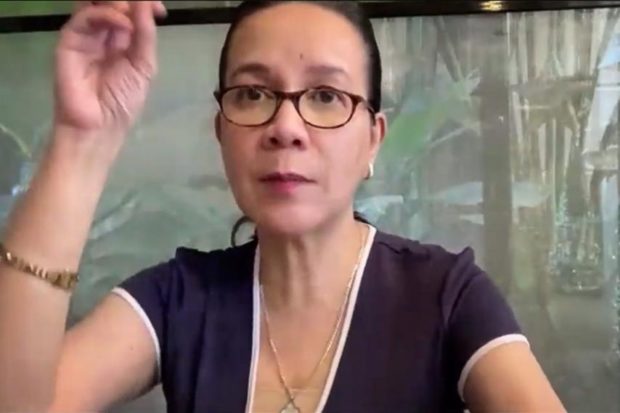
Sen. Grace Poe. Screen grab / Senate PRIB file photo
MANILA, Philippines — Transport authorities earned the ire of Senator Grace Poe on Tuesday after an official attempted to explain with a “flawed” reason why private vehicles were supposedly prioritized in road worthiness inspections instead of public vehicles.
During a hearing of the Senate public services committee, Poe pointed out that major road accidents usually involve public utility vehicles (PUVs).
“Bakit niyo inuna ang private vehicles e alam naman natin ang public vehicles, halimbawa, yung mga bus, hindi naman lahat pero yung mga sakuna na malalaki talagang trahedya ay nagaganap dito sa mga pampublikong sasakyan na ‘to na mas maraming nakasakay at nakikinabang,” Poe, who is leading the hearing, asked transport officials.
(Why did you prioritize the private vehicles, since we all know that buses, not all of them, but most accidents really happen involving public vehicles and many people are using them.)
“Tuloy, iniisip ng marami kasi kikita kayo sa private vehicles dahil mas marami ito,” she added.
(Many people now think that you prefer income [over safety] because private vehicles are many [compared to public vehicles].)
According to the Land Transportation Office (LTO), there are four million private vehicles in the country, excluding motorcycles.
Meanwhile, there are 400,000 public vehicles, the Land Transportation Franchising and Regulatory Board told the committee.
After learning these figures, Poe said it would have been easier to roll out the Motor Vehicle Inspection System (MVIS) for PUVs.
“We have 400,000 public vehicles as opposed to 4 million private vehicles. So if you wanted to test the capability of these [inspection] centers, it would have been easier and probably even better to test public vehicles first,” the senator said.
“So bakit ninyo inuna ang private vehicles?” she added.
(So why did you put the private vehicles first?)
LTO Assistant Secretary Edgar Galvante clarified to Poe that the MVIS includes PUVs but is limited to vehicles weighing up to 4,500 kilograms.
“Kaya po yung mga jeep natin, kasama po yan,” he said.
(That is why jeepneys are also included.)
Still, Poe questioned why the MVIS seems unprepared to accommodate other public vehicles.
“Bakit hindi handa sa public vehicles?” she asked.
(Why were you unprepared for public vehicles?)
Department of Transportation (DOTr) Assistance Secretary for Procurement of Project Implementation Giovanni Lopez, at this point, explained to the Senate panel that due to a failure of bidding for the procurement of mobile vehicle inspection system for PUVs, the agency opted to push through with the rollout of the MVIS for private vehicles so as not to interrupt the inspection program.
“The first plan is supposed to be to address directly the public utility vehicles and the Phase 2 is to address the private motor vehicles. So ang ginawa po natin para tuloy-tuloy po lang po ang programa is that we push through with the second phase, which is the private motor vehicles by accrediting the private,” Lopez said.
(What we’ve done is to continue on with the program and pushed through with the second phase, which is the private motor vehicles by accrediting the private.)
Further, he added that the agency also recognizes the need for the DOTr and the LTO to reassess and reevaluate the standards that are set for public utility vehicles.
But this explanation did not sit well with Poe.
“So ang sinasabi mo ngayon nagpapakadakila na na unahin natin ng ang private vehicles para makahanap tayo ng paraan na maging mas madali para sa PUVs?” she said.
(So what you are saying is that you are feeling great to put private vehicles first so we can find a way that will make it easier for PUVs?)
“It’s seems very flawed to me. Thank you for your attempt to explain this,” she added.
Poe also pointed out that when the DOTr and the LTO issued its guidelines for the private motor vehicle inspection centers (PMVICs) last December 29, 17 PMVICs “were already operating.”
“So parang nagtataka lang ako anung nangyari dito? Hindi pa rin malinaw ngayon kung bakit ninyo inuna pa rin private vehicles para sabihin na para padaliin sa PUVs kaya inuna ninyo ang private vehicles, anong klaseng dahilan yan?” she added.
(So I’m just wondering what happened here? It is still not clear why did you prioritized the private vehicles so that it can be easier for PUVs that is why you put private vehicles first, what kind of reasoning is that?)